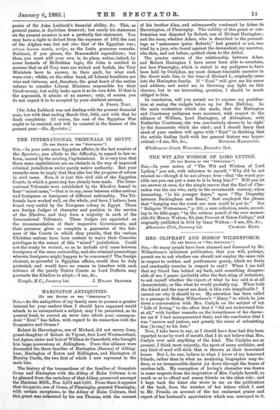THE INTERNATIONAL TRIBUNALS IN EGYPT. LTO THE EDITOR OF THE
" SPECIATOR.1 your note upon Egyptian affairs, in the last number of the Spectator, you allude to the difficulty, in regard to law re- form, caused by the existing Capitulations. It is very true that these same capitulations are an obstacle in the way of improved .criminal jurisdiction under purely native authority. But your remarks seem to imply that they also bar the progress of reform in civil cases. Now, it is just this civil side of the Egyptian Courts in which a great step has already been made. The Inter- national Tribunals were established by the Khedive Ismail to bear " mixed cases,"—that is to say, cases between either natives and foreigners or foreigners of different nationality. The Tri- bunals have worked well, on the whole, and have, I believe, been -found very useful by the European colony in Egypt. There are foreign Judges of character and position in the service of the Khedive, and, they form a majority in each of the International Tribunals. These Judges are appointed on the recommendation of their respective Governments, and their presence gives so complete a guarantee of the fair- ness of the Courts in which they preside, that the various Christian nations have been content to waive their Consular privileges to the extent of this " mixed " jurisdiction. Could not the treaty be revised, so as to include civil cases between foreigners of the same nationality, and also criminal proceedings wherein foreigners might happen to be concerned ? The foreign element, so powerful in Egyptian affairs, would then be duly_ protected, and would have no reason to interfere with such Preforms of the purely Native Courts as Lord Dufferin may persuade the Khedive to adopt.—I am, &c.,














































 Previous page
Previous page